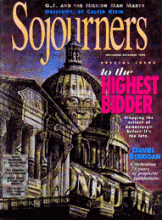Recently, I was having dinner with a young Christian lawyer and his wife in Australia. Tim had served for a while as the mayor of a small inner-city community that is part of the city of Melbourne. Now working as a pastor again, for a large downtown church, he has responsibilities for articulating the moral dimensions of many public issues as they impact the lives of people in that city.
Because of his success as a mayor and a pastor, and his high profile on a number of political issues, Tim is being approached about a possible run for the parliament of Australia. He's been asked before and, with his wife, Meredie, declined for family reasons-including the need of young children for their father's presence. Now the questions are coming up again, and I was privileged to be included in the family discussion.
The issues being discussed were all the right ones-impact on the family, personal motivations, the temptations of political power, and whether a "prophetic" role from a church base or a more "political" role in the legislature is the more effective or faithful role for Tim.
The issue of money came up only briefly and tangentially. Tim explained that all candidates receive a reimbursement of 30 cents for every vote they get, and he was assured to get enough support to cover his campaign expenses even if he lost. He also predicted the cost of his election campaign to be only in the tens of thousands of dollars.
When I told them what a comparable campaign now costs in the United States, they were both incredulous. "We could never raise that kind of money," Tim exclaimed, "unless we could get the support of the very rich and powerful." Exactly.
Read the Full Article

